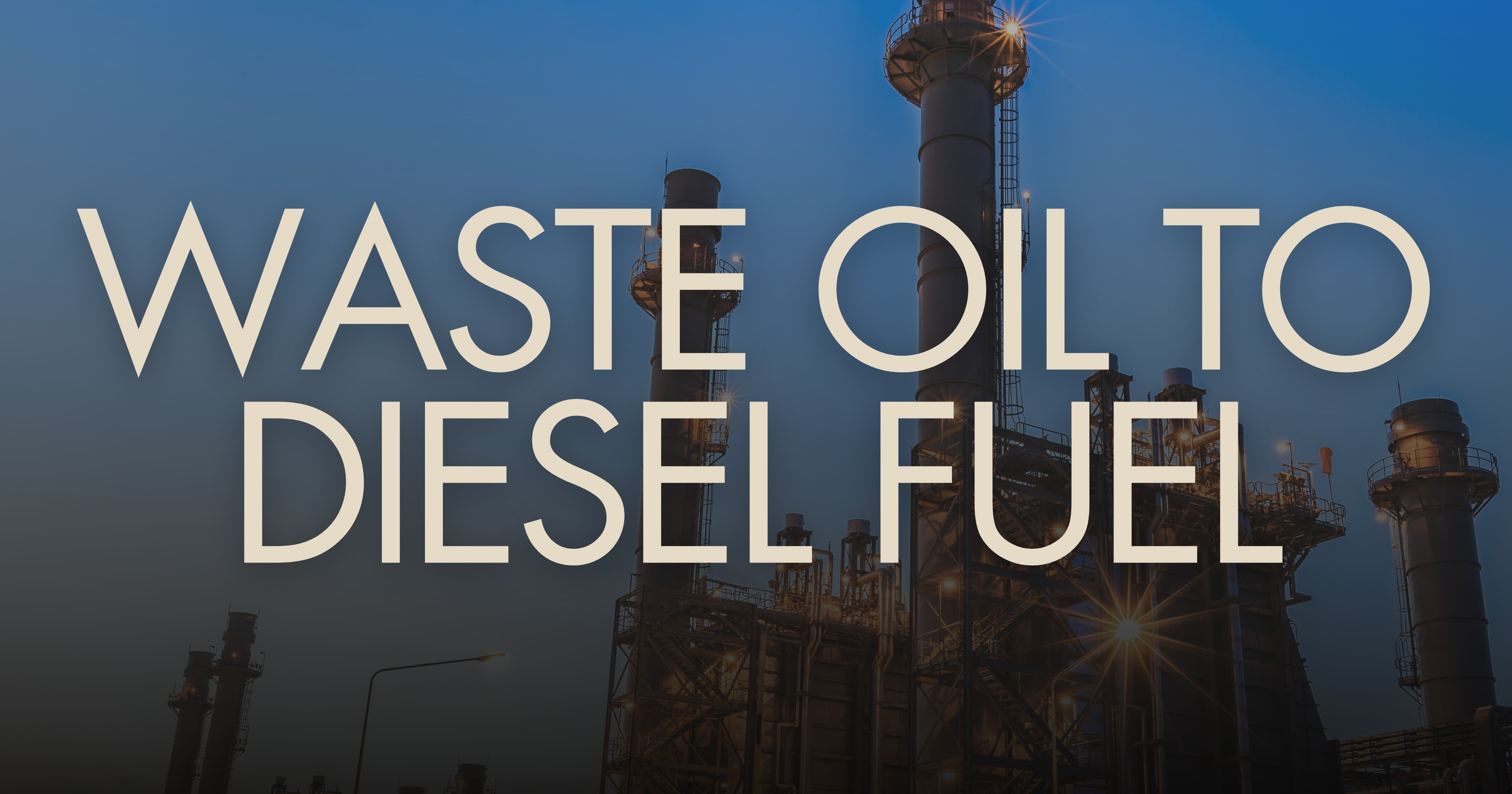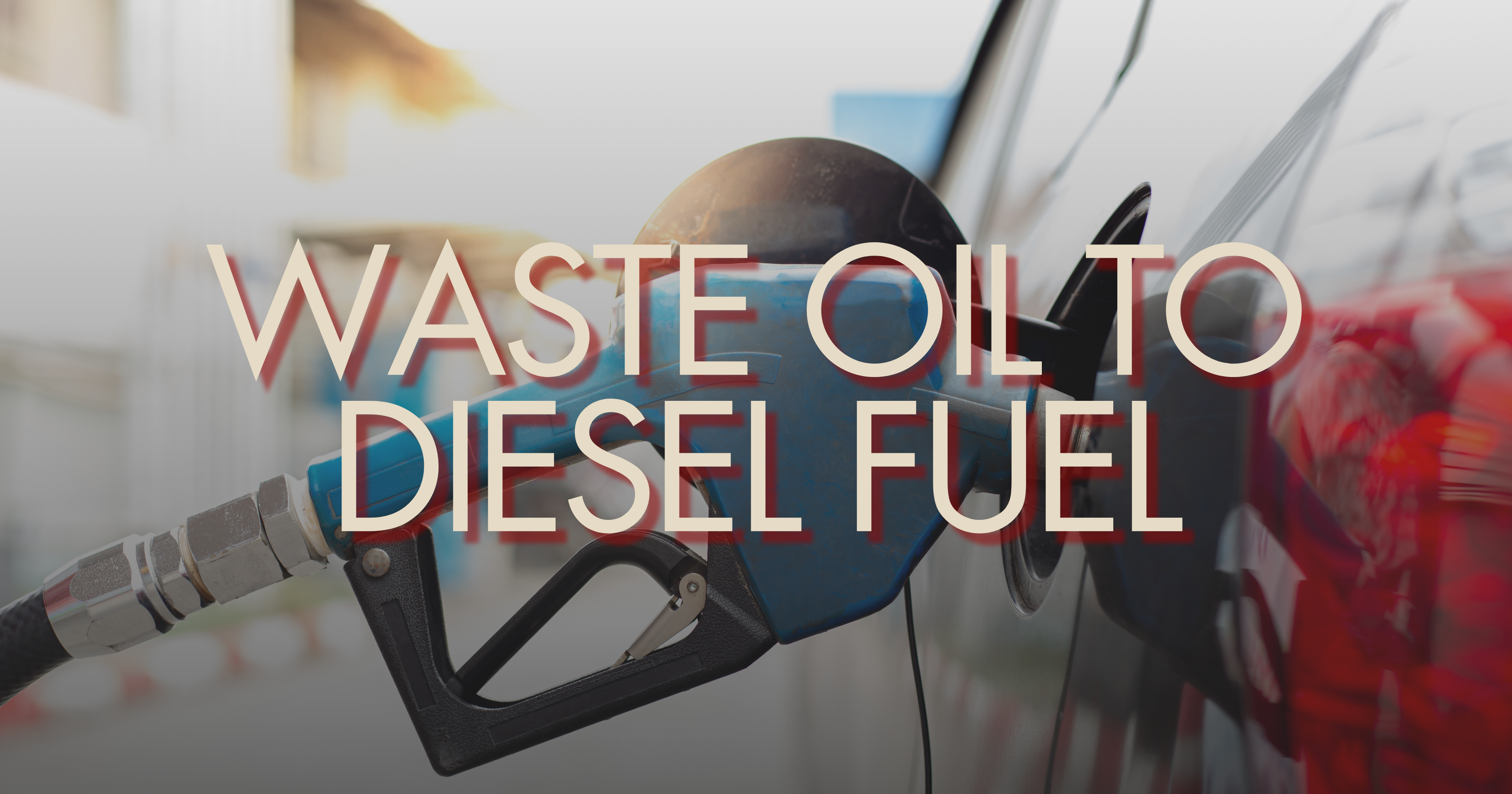In today’s fast-paced world, sustainability is no longer a choice — it’s a necessity. Across industries, beyond people are rethinking what happens to waste, and one innovation is leading the movement: Waste Oil to Diesel Fuel plants.
These plants, developed and operated by VeeraGroup, are revolutionizing how industries treat used oils — not as waste, but as a powerful opportunity to protect the planet and save money.
Let’s explore how Waste Oil to Diesel Fuel plants are saving the environment and your money, and why businesses in Chennai, Coimbatore, and across India are adopting this green energy revolution.
1.Increasing Significance of Waste Oil to Diesel Fuel

Every year, thousands of litres of waste oil are produced by vehicles, ships, and industries. Unfortunately, much of it ends up dumped in landfills or drains, polluting soil and water.
That’s where Waste Oil to Diesel Fuel plants come in. These advanced facilities transform waste oil into clean, reusable diesel fuel through distillation and purification processes.
Environmental Benefits
-
Stops oil pollution in soil and groundwater.
-
Reduces harmful emissions caused by burning waste oil.
-
Encourages responsible and sustainable waste management.
Each litre of oil recycled by VeeraGroup’s Waste Oil to Diesel Fuel plants means one less litre polluting the environment — proof that technology and sustainability can go hand in hand.
2.Environmental Problem of Waste Oil

While the environmental benefits are clear, what truly excites industries is the significant cost savings.
Traditional diesel, made from crude oil, is expensive and subject to constant global price fluctuations. In contrast, diesel from waste oil is locally produced, affordable, and price-stable.
How Businesses Save Money
-
Lower production costs: Diesel from recycled oil is cheaper to produce.
-
Reduced waste disposal expenses: No more paying for hazardous waste removal.
-
Fuel self-sufficiency: Businesses can produce their own fuel for operations.
Many industries in Tamil Nadu have achieved up to 40% fuel cost reduction after installing VeeraGroup’s Waste Oil to Diesel Fuel plants — a smart investment that pays for itself both financially and environmentally.
3. Strengthening India’s Circular Economy
Waste Oil to Diesel Fuel – A Circular Model
The Waste Oil to Diesel Fuel process is a textbook example of a circular economy, where waste becomes a resource rather than garbage.
Instead of a “use and throw” model, these plants promote a “reuse and regenerate” mindset — turning discarded oil into valuable fuel.
Circular Economy Benefits
-
Converts waste oil into raw material for energy.
-
Reduces dependence on crude oil imports.
-
Minimizes waste generation and disposal needs.
-
Supports India’s Sustainable Development Goals (SDGs).
Through this closed-loop process, VeeraGroup’s Waste Oil to Diesel Fuel plants make sustainability both practical and profitable.
4. Promoting Energy Independence and Security
India imports over 80% of its crude oil, a heavy dependence that impacts national energy security and fuel prices.
By setting up Waste Oil to Diesel Fuel plants, companies can produce their own diesel locally, reducing reliance on global suppliers and unstable oil markets.
Energy Security Benefits
-
Domestic production: Cuts down on import dependency.
-
Stable fuel supply: Ensures access even during global shortages.
-
National alignment: Supports Atmanirbhar Bharat (Self-Reliant India) vision.
In a world where fuel prices fluctuate overnight, these plants provide a consistent and reliable energy source — a major strategic advantage for Indian industries.
5. Boosting Job Creation and Local Economic Growth
Apart from environmental and financial benefits, Waste Oil to Diesel Fuel plants also stimulate local economies.
Each project — from design to operation — creates jobs for engineers, technicians, and maintenance professionals.
Local Economic Impact
-
Encourages green job creation across Tamil Nadu.
-
Builds local expertise in renewable energy systems.
-
Strengthens both rural and urban economies.
By investing in VeeraGroup’s Waste Oil to Diesel Fuel technology, companies actively support India’s green growth mission.
6.Benefits of the Conversion from Waste Oil to Diesel Fuel

When it comes to innovation, VeeraGroup leads the way in India’s waste-to-energy transformation.
With years of research, global collaboration, and successful project execution, VeeraGroup combines technical excellence with environmental accountability.
Why Choose VeeraGroup
-
Proven leadership in waste-to-diesel technology.
-
Advanced, efficient distillation and purification systems.
-
Custom-built plants for small and large-scale capacities.
-
Dedicated after-sales support and training for operators.
From Chennai’s industrial zones to Coimbatore’s textile hubs, VeeraGroup’s Waste Oil to Diesel Fuel plants help businesses run smarter, cleaner, and more profitably.
7. The Environmental Math – Every Drop Counts
Did You Know?
-
1 litre of waste oil can contaminate up to 1 million litres of freshwater.
-
Recycling that same litre can produce 0.9 litres of usable diesel fuel.
Each VeeraGroup Waste Oil to Diesel Fuel plant eliminates thousands of litres of pollution monthly while producing high-quality, low-emission fuel.
That’s not just good for the planet — it’s excellent for your bottom line.
8. The Future is Waste-to-Energy
As global energy demand grows and traditional fuel sources shrink, waste-to-energy technology is becoming the key to a sustainable future.
Waste Oil to Diesel Fuel plants are not just industrial systems — they represent a new era of conscious energy use and green innovation.
By investing in this technology today, industries are ensuring a cleaner, more profitable tomorrow.
Conclusion – A Win-Win for Business and Nature
Waste Oil to Diesel Fuel plants are rewriting the rules — proving that sustainability and profitability can coexist.
By converting hazardous waste into valuable fuel, these plants are:
-
🌿 Protecting the environment
-
💰 Reducing fuel expenses
-
🧑🔧 Boosting local economies
-
⚡ Strengthening energy independence
And at the heart of it all is VeeraGroup, India’s most trusted partner in Waste Oil to Diesel Fuel technology.
It’s time to go beyond pollution and embrace profitable sustainability — with VeeraGroup leading the charge.
Frequently Asked Questions (FAQs)
1. How do Waste Oil to Diesel Fuel plants help the environment?
They prevent waste oil from polluting soil and water, reduce harmful emissions, and generate clean fuel to replace conventional diesel.
2. How much can industries save using these plants?
On average, companies save up to 40% in fuel costs by converting waste oil into diesel fuel through VeeraGroup’s systems.
3. Are the plants environmentally safe?
Yes. VeeraGroup’s technology ensures minimal emissions, zero waste discharge, and full compliance with pollution control norms.
4. Where does VeeraGroup operate?
VeeraGroup operates across Chennai, Coimbatore, and multiple industrial regions in India, providing tailor-made waste-to-diesel solutions.
5. Why should businesses choose VeeraGroup?
With years of experience, modern technology, and complete after-sales support, VeeraGroup guarantees efficiency, quality, and sustainability in every project.
